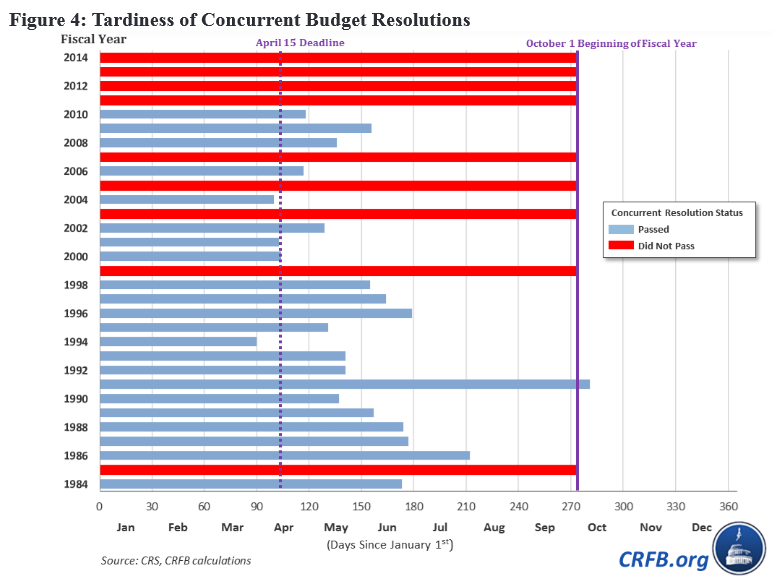Budget Act at 40: BPC Hosts Panel Discussion
The Bipartisan Policy Center held an event Tuesday commemorating the 40th anniversary of the Congressional Budget Act, which became law on July 12. The event featured two panel discussions: The first panel included six former directors of the Congressional Budget Office (including CRFB Board members Alice Rivlin, Rudy Penner, and Dan Crippen), and the second panel consisted of former chairmen and members of the House and Senate Budget Committees (including CRFB Co-Chair Bill Frenzel and Board member Jim Jones). Bill Hoagland, another CRFB Board member, presided over the event. Both panels touched on the merits of the Congressional Budget Office, which the Budget Act created, and the failure of Congress to pass concurrent budget resolutions in recent years. The speakers also touched on many of the issues raised in our recent paper on the problems with the budget process. On the whole, the panelists stated that the political polarization of Congress, not inadequacies in the Budget Act, was a main reason for the gridlock in the process.
See the full videos of the panels here.
Regarding budgetary stalemate in Congress, the panelists had little criticism for the Budget Act itself. In fact, Alice Rivlin said the fiscal situation would be worse if the Budget Act had not been passed as the law has been used effectively and beneficially over the years. She also noted that the Budget Act established an organized way for Congress to “put the spending side and revenue side together.”
Former Rep. Robert Walker (R-PA) criticized the Senate in particular for its "unacceptable" failures in passing conference reports for budget resolutions. Though he acknowledged the difficulty of the process, he dubbed it a necessary and noble one. He asserted that Congress should be held accountable like any business with a budget—failure to meet the deadline should not be an option. He called for the media to put more pressure on lawmakers to "return to regular order and abide by the Budget Act." Similarly, Dan Crippen also made the point that the failure of Congress to use the Budget Act points to a larger problem of Senate procedure. He said the law was created as a way to bypass Senate rules and pass legislation, yet it still fails to do so.
There was also much praise heaped on CBO. Alice Rivlin highlighted the importance CBO has brought to the budgeting procedure. Unbiased analysis has greatly helped Congress estimate projected costs of proposals and interpret their current standing, she said. Doug Holtz-Eakin commented that the formation of the CBO has been terrific for Congress, and the existence of both CBO and OMB has made both agencies better and more accurate. Futhermore, former Sen. Pete Domenici (R-NM) said if the Budget Act had only created the CBO, it would still have been a worthwhile endeavor due to the importance of accurate and unbiased information.
Source: BPC. Pictured (left to right): Former CBO Directors Dan Crippen, Doug Holtz-Eakin, Peter Orszag, Rudy Penner.
The idea of stronger leadership in budgeting was mentioned frequently, with at least several panel members suggesting that the Budget Committees should be comprised of congressional leaders or should take stronger leadership roles. Frenzel called for the committees to be more resolute in their convictions and to follow their own deadlines. If budgeting is a priority for congressional leaders, it will be a priority for the whole Congress, and the system will be more effective.
Overall, political polarization was cited as a main cause of the recent ineffectiveness of the budget process. Frenzel said the polarization of the voters forces candidates to drift toward extremes which, in turn, stalls progress in Congress. He is optimistic that a return to “the middle will cycle back soon,” and voters will support a less confrontational approach, forcing their representatives to follow suit. Jones also stressed the need to return to the dynamic of bipartisan coalitions that existed during his time on the House Budget Committee. Former Rep. Dick Gephardt (D-MO) cited low voter turnout as a cause of polarization—more extreme candidates attract attention and win over loyal voters. To block them from “taking power” and stalling all legislation, he called for a re-education of the American people on the importance of voting.
Biennial budgeting was briefly mentioned as a way to reform the budget process, with Rivlin saying that "less frequent is better," and the extra time in the off-year could help members refine their proposals. Conversely, Rudy Penner argued that “budgeting is imperfect” by nature, and more frequent updates ensure that the budget is being changed and improved as needed. He also noted that political conditions are important for successful budgets—if ideal conditions occurred during an off-year in a biennial system, the year would pass without any fiscal results to show for the conducive setting.
In general, the event produced a lively discussion and provided an opportunity to learn from the panelists' wealth of experience in budget making.




